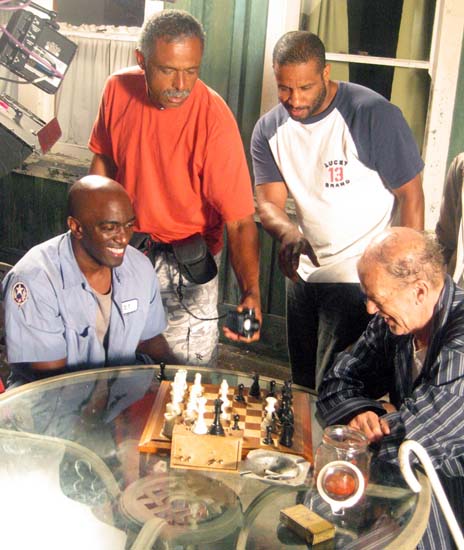‘Forgive Us Our Transgressions’ shows remnants of past racism

CARABINER COMMUNICATIONS
(Left to right) Donald Morgan, Walter Richardson, Derek Shaun and Gary Gardner of “Forgive Us Our Transgressions.”
By Elizabeth Packer
Oct. 26, 2009 9:12 p.m.
With the nation’s first black president sitting comfortably in the White House, the United States has certainly evolved past its legacy of slavery and segregation. Yet as UCLA graduate Walter Richardson aims to show in his short film “Forgive Us Our Transgressions,” racism and violence toward black individuals is not something of the past.
“I thought it was amazing that there were people alive today that had witnessed public lynching. When we talk about slavery, when we talk about civil rights, we seem to think that those things are so far in our past that nothing exists of it and that there’s no remnants of it, but there are,” Richardson said.
Richardson wrote and directed “Forgive Us Our Transgressions,” which will screen on Oct. 29 at the Kodak Theatre, as his thesis film for the graduate directorial program at UCLA. His story features a young black man who must come to terms with the discovery that his elderly white friend took part in his grandfather’s lynching 60 years ago.
During filming, Richardson attempted to make sure the racial tensions and controversial subject matter of lynching were portrayed in an appropriately nuanced way.
“When you’re dealing with subject matter this serious, there’s a chance that it could become melodrama. And once it becomes melodrama, then you lose the impact,” Richardson said.
In order to bring his vision to life, Richardson relied on the support of several UCLA classmates and professors. The film is coproduced by UCLA theater alumnae Alexandra Creswick and Kathy Cabrera, who also helped Richardson develop the story. UCLA theater professor Gary Gardner plays a starring role, and the film’s cinematographer, Donald Morgan, has also taught classes in UCLA’s theater department.
Morgan said working within the constraints of a student film proved to be a challenge for the cast and crew.
“You know you don’t have much budget and you don’t have much time, so for me I had to help (Richardson’s) vision come to life ““ try to make everybody look as good as possible while keeping everything within the little budget that we did have,” Morgan said.
Additionally, producing a short film forced Richardson to streamline his story, distilling his message into a form that could be conveyed in 24 minutes.
“You want to lead the audience down a very direct path and really want to give them a conclusion, but you don’t have a lot of time to do it. So it has to be very efficient,” Richardson said.
Richardson and Cabrera have since collaborated on a feature-length screenplay inspired by the story of “Forgive Us Our Transgressions.” The two have completed the script, titled “Secrets of the South,” and hope to begin shooting in summer 2010, according to Cabrera.
Despite a limited budget and a tight schedule for this short film, Gardner, who has acted in student films in the past, said that working with others affiliated with UCLA helped create a comfortable environment on set.
“UCLA projects (such as “˜Forgive Us Our Transgressions’) involve people you know, so you already feel like family. … You have the same background, the same goals,” Gardner said.
On top of the sense of on-set camaraderie created by UCLA connections, Richardson relied on professors and fellow classmates for help in the process of translating his ideas into a finished film. Even though he graduated in June 2008, Richardson said he can still turn to professors for advice, citing Theater, Film and Television professor Nancy Richardson’s continued involvement in the editing process of “Forgive Us Our Transgressions” as proof of their dedication.
“With UCLA professors, you’re not just getting a professor, you’re getting a working professional and a friend ““ someone that you can call almost anytime and they will sit down with you and make sure you’re heading in the right direction,” Walter Richardson said.
Now that the film is complete and being screened, Richardson and the rest of the cast and crew hope that college-aged students will be interested in seeing it.
“It’s hard to dramatize history without an agenda, and I think Walter has done a remarkably good job of doing this. Lynchings were a very big part of this country, and now, we can try and pretend they didn’t exist … but they did. So I think we have to look at the ugly parts of the country to help the country heal,” Gardner said.
Richardson added that he believes college students have the most potential to make a difference.
“Seeing a film like this, you understand ““ OK, things like this did happen and some of our past is ugly. But if we cannot forgive and move forward, then we will always be stuck in the past,” Richardson said. “Hopefully college students will see that even an atrocity like this ““ as horrific as a lynching ““ under the right circumstances, it can be forgiven and we can move forward and we can come together as a nation and make this world a better place.”


